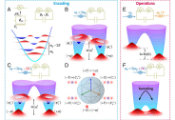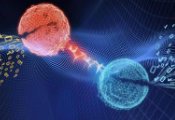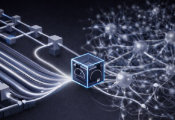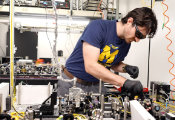New Paradigm of Quantum Information Technology Revealed Through Light-Matter Interaction!
November 18, 2024 -- A research team led by Professor Jaedong Lee from the Department of Chemical Physics of DGIST (President Kunwoo Lee) has introduced a novel quantum state and a pioneering mechanism for extracting and controlling quantum information using exciton and Floquet states.
Collaborating with Professor Noejung Park from UNIST’s Department of Physics (President Chongrae Park), the team has, for the first time, demonstrated the formation and synthesis process of exciton and Floquet states, which arise from light-matter interactions in two-dimensional semiconductors. This study captures quantum information in real-time as it unfolds through entanglement, offering valuable insights into the exciton formation process in these materials, thereby advancing quantum information technology.
Unlike traditional three-dimensional solids, where quantum coherence is challenging to maintain owing to thermal influences, two-dimensional semiconductors feature energy levels for excitons and conduction bands that remain distinct owing to weaker screening effects, thus preserving coherence over extended periods. This distinction makes two-dimensional semiconductors promising for developing quantum information devices. Yet, until now, the coherence and decoherence mechanisms of electrons during exciton formation have been poorly understood.
Through theoretical calculations using time-resolved angular-resolved photoelectron spectroscopy on two-dimensional semiconductor materials, Professor Lee’s team confirmed that exciton formation coincides with the creation of a Floquet state, producing a combined new quantum state. Additionally, they identified the mechanism by which quantum entanglement occurs within this state and proposed a real-time method to extract, unfold, and control quantum information.
Professor Jaedong Lee, of DGIST’s Department of Chemical Physics, commented, “We have discovered a new quantum state, known as the exciton-Floquet synthesis state, and proposed a novel mechanism for quantum entanglement and quantum information extraction. This is anticipated to drive forward quantum information technology research in two-dimensional semiconductors.” UNIST’s Professor Noejung Park added, “This research sets a new paradigm for quantum information technology, including quantum computers, marking an important milestone for its realization.”
The research received funding from the Korea Research Foundation’s Mid-Career Researcher Support Program and DGIST’s International Joint Research Project. The findings (first author: Hyoseop Park, on Integrated Track of DGIST’s Department of Chemical Physics) were published in Nano Letters, a leading journal in nanoscience and technology, in October.




































